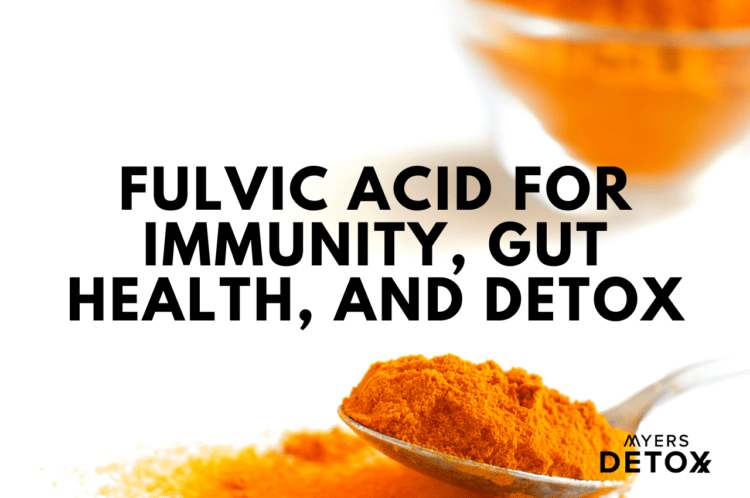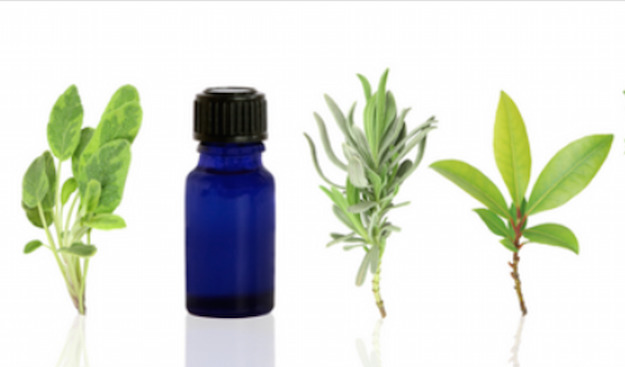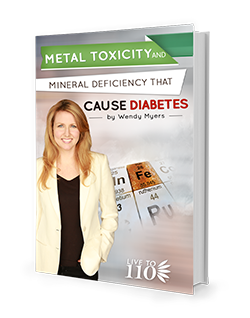Fulvic Acid for Immunity, Gut Health, and Detox

You may have never heard of fulvic acid; it certainly doesn’t make the headlines very often. However, this crucial soil component may be the missing link to your health and longevity.
In this article, you’ll learn:
- What is fulvic acid?
- How fulvic acid boosts immunity and your health
- The powerful detoxification benefits of fulvic acid
- How to take fulvic acid
What Is Fulvic Acid?
Fulvic acid is known as a humic substance — meaning that it comes from a layer of soil called the humus. The humus layer of soil develops from the decay of plant and animal matter and becomes an essential source of nutrients for the plant life that lives in and around it.
Fulvic acid is made up of small water-soluble molecules that are either free or bound to minerals. These biologically active compounds are usually golden in color and are made up of mostly oxygen, nitrogen, hydrogen, and carbon.
In general, you’ll find fulvic acid in soil, water, sewage, compost heaps, lake sediments, and peat bogs and ancient deposits [1].
The primary benefit associated with fulvic acid is its strong binding capacity. Even though it has a small molecular size, fulvic acid can bind many times its weight in minerals. This makes it an excellent carrier of nutrients both in and out of cells.
This is clearly exemplified in soil as fulvic acids assist in carrying nutrients from the soil into plant cells for nourishment.
In the human body, fulvic acids play a supportive role in both immunity and detoxification. As strong chelating agents, they help to both nourish your body and remove unwanted compounds[1].
Health Benefits of Fulvic Acid
Due to its powerful carrying capacity, fulvic acid can be used to support many aspects of health, including:
#1 Gut Health and Nutrient Absorption
As mentioned above, fulvic acid acts as a carrier for nutrients. This means that it can bind to minerals and help to shuttle them into your cells — effectively enhancing your body’s ability to absorb them[2].
What’s more, research shows that fulvic acid can enhance the activity of digestive enzymes, another pathway to increase nutrient utilization and absorption[3].
In regards to your microbiome, fulvic acid has been shown to shift gut flora, enhancing the balance of healthy bacteria up to 30% in your gut. That’s a pretty significant shift.
As a result, fulvic acid may be useful for disorders of the gastrointestinal tract like irritable bowel syndrome (IBS) and may even offer an alternative to fecal transplant for conditions like obesity and diabetes[4].
#2 Overall Immunity
Perhaps one of the most well-known benefits of fulvic acid is its role in boosting immunity and helping to maintain a healthy inflammatory response [4][2].
It works by supporting a healthy immune response by increasing antibody production, supporting inflammatory factor inhibition, and combating oxidative stress that often goes hand in hand with immune reactions[3].
Research shows that fulvic acid specifically supports humoral immunity stimulation.[5].
#3 Heavy Metal Detoxification
As mentioned above, fulvic acid has a powerful binding capacity, which makes it excellent for not only bringing nutrients into a cell but also for pulling toxins out.
Fulvic acid’s binding capabilities are often seen in bodies of water and soil where humic compounds can naturally reduce the concentration of heavy metals up to 90%. Heavy metals such as lead, cadmium, copper, and nickel all become bound to these fulvic acid molecules, rendering them unavailable[6][7].
In the human body, through a process called adsorption, fulvic acid can bind heavy metals in your tissues and remove them to be eliminated. This makes fulvic acid an excellent nutrient to use for heavy metal detox.
What’s more, the antioxidant activity of fulvic acid can further support a gentle detox by combating free radicals generated in the detoxification process[8].
One does have to be careful about the source of fulvic acid. Fulvic acid can be contaminated with loads of heavy metals. You want to be sure to take a clean source of fulvic acid that has testing to show it is free of heavy metals. I’d say that most sources on the market today are contaminated, some with shockingly high levels of heavy metals like lead.
#4 Mitochondrial Function
Your mitochondria are the powerhouse of your cells. They are the hub where the food you consume becomes transformed into energy that your body can use to fuel all of its essential processes.
When your mitochondria are dysfunctional or weak, issues like chronic fatigue, adrenal imbalances, muscle weakness, and many more can present. In fact, in order for your immune system to protect you, having healthy mitochondria is essential.
Research shows that fulvic acid can support the health of your mitochondria by preserving its function and integrity. In one animal study, fulvic acid supplementation resulted in increased climbing behavior and mobility, along with decreased anxiety in rats with chronic fatigue syndrome[12].
As a rich source of oxygen, one of the ways in which fulvic acid may enhance mitochondrial function is by supporting a process called oxidative phosphorylation. Without getting too deep into the science, this is the process by which your mitochondria uses nutrients (including oxygen) to package energy in the form of ATP (adenosine triphosphate). ATP then becomes available for your body to use as fuel[13].
#5 Rich Source of Minerals
Fulvic acid is an incredibly rich source of minerals that play a myriad of roles in your body. The minerals you consume are involved in everything from enhancing enzyme activity to promoting cell to cell communication to supporting detox.
In fact, another way that fulvic acid promotes cellular health and detox is through the ability of minerals to displace heavy metals on enzyme binding sites[19]. While many metals have an affinity for these sites, flooding your system with minerals can help to push them out.
When heavy metals bind to enzymes in these sites, they can disrupt the enzyme’s normal function and structure. This can lead to toxic effects and disruption of normal physiological processes[18].
Fulvic Acid for Immunity
In the past, when people lived off the land, they would get plenty of fulvic acid in their diets by consuming trace amounts of soil here and there. Today, however, we don’t get to enjoy freshly picked fruits and vegetables like they did many years ago.
While it may be convenient to pop over to the supermarket for your weekly groceries, you end up missing out on many of the benefits that natural soil offers — including fulvic acids and beneficial bacteria.
It’s pretty well understood at this point that “eating dirt” aka consuming small amounts of soil is hugely beneficial to immunity, we just don’t have a civilized way to go about it. That’s why supplementing with nutrients like fulvic acid can make such a profound difference in supporting your health[17].
For the ultimate immune-boosting supplement, I combined fulvic acid with cilantro extract and grapefruit citrus pectin into a formulation I call CitriCleanse.
CitriCleanse supports your immune system by offering a combination of fulvic and humic acids (two nutrient-rich parts of the humus layer of soil), with the addition of two heavy metal detox superstars — cilantro and grapefruit citrus pectin.
This formula clears your body of energy-zapping heavy metals, and primes your immune system to be firing on all cylinders with the benefits of fulvic and humic acid.
So short of going out in your backyard and eating a spoonful of soil every morning (would you even want to?), this is your next best bet.
Fulvic Acid and Shilajit
In Ayurvedic medicine, a form of fulvic acid known as shilajit has been used for thousands of years to treat a wide range of health conditions. Shilajit, which is made up of approximately 50% fulvic acid, is sourced from the Himalayas.
Ayurvedic practitioners offer shilajit as an adaptogen, helping to balance the nervous and endocrine systems. It’s also considered a rasayana, which means it rejuvenates the body and strengthens its defenses.
According to Ayurveda, taking shilajit regularly promotes strength, stamina, and energy and is one of the most powerful rejuvenators.
Takeaway
Fulvic acid, which would historically be a natural part of your diet, plays a crucial role in the health and maintenance of your immune system.
It’s also amazing for gut health and aiding nutrient absorption, not to mention being a source of concentrated minerals.
From energy support to heavy metal detox — fulvic acid supports your body on all levels. I take fulvic and humic acid daily to facilitate heavy metal detoxification. It’s one of nature’s gifts that benefits health on so many levels.
Grab some CitriCleanse to start replenishing your cells and offering your body the nutrients your ancestors enjoyed.
Click Here for References+
-
Gandy, Justin John, et al. “Phase 1 clinical study of the acute and subacute safety and proof-of-concept efficacy of carbohydrate-derived fulvic acid.” Clinical pharmacology: advances and applications 4 (2012): 7.
-
Mirza, Mohd Aamir, et al. “Role of humic acid on oral drug delivery of an antiepileptic drug.” Drug development and industrial pharmacy 37.3 (2011): 310-319.
-
Winkler, John, and Sanjoy Ghosh. “Therapeutic potential of fulvic acid in chronic inflammatory diseases and diabetes.” Journal of diabetes research 2018 (2018).
-
Swidsinski, Alexander, et al. “Impact of humic acids on the colonic microbiome in healthy volunteers.” World journal of gastroenterology 23.5 (2017): 885.
-
Vucskits, A. V., et al. “Effect of fulvic and humic acids on performance, immune response and thyroid function in rats.” Journal of Animal Physiology and Animal Nutrition 94.6 (2010): 721-728.
-
Klučáková, Martina, and Marcela Pavlíková. “Lignitic humic acids as environmentally-friendly adsorbent for heavy metals.” Journal of Chemistry 2017 (2017).
-
Lalas, Stavros, Vasilios Athanasiadis, and Vassilis G. Dourtoglou. “Humic and Fulvic Acids as Potentially Toxic Metal Reducing Agents in Water.” CLEAN–Soil, Air, Water 46.2 (2018): 1700608.
-
Rodríguez, Noemí Cárdenas, et al. “Antioxidant activity of fulvic acid: a living matter-derived bioactive compound.” Journal of Food, Agriculture & Environment 9.3&4 (2011): 123-127.
-
Chien, Shao-Ju, et al. “Fulvic acid attenuates homocysteine-induced cyclooxygenase-2 expression in human monocytes.” BMC complementary and alternative medicine 15.1 (2015): 61.
-
Sharma, Praveen, et al. “Shilajit: evalution of its effects on blood chemistry of normal human subjects.” Ancient science of life 23.2 (2003): 114.
-
Swidsinski, Alexander, et al. “ImpacOttman, Noora, et al. “Soil exposure modifies the gut microbiota and supports immune tolerance in a mouse model.” Journal of allergy and clinical immunology 143.3 (2019): 1198-1206.t of humic acids on the colonic microbiome in healthy volunteers.” World journal of gastroenterology 23.5 (2017): 885.
-
Surapaneni, Dinesh Kumar, et al. “Shilajit attenuates behavioral symptoms of chronic fatigue syndrome by modulating the hypothalamic–pituitary–adrenal axis and mitochondrial bioenergetics in rats.” Journal of ethnopharmacology 143.1 (2012): 91-99.
-
Visser, S. A. “Effect of humic substances on mitochondrial respiration and oxidative phosphorylation.” Science of the Total Environment 62 (1987): 347-354.
-
Jayasooriya, Rajapaksha Gedara Prasad Tharanga, et al. “Fulvic acid promotes extracellular anti-cancer mediators from RAW 264.7 cells, causing to cancer cell death in vitro.” International immunopharmacology 36 (2016): 241-248.
-
Aydin, S. Kerem, et al. “Effects of fulvic acid on different cancer cell lines.” Multidisciplinary Digital Publishing Institute Proceedings 1.10 (2017): 1031.
-
Pant, Kishor, et al. “Mineral pitch induces apoptosis and inhibits proliferation via modulating reactive oxygen species in hepatic cancer cells.” BMC complementary and alternative medicine 16.1 (2016): 148.
-
Ottman, Noora, et al. “Soil exposure modifies the gut microbiota and supports immune tolerance in a mouse model.” Journal of allergy and clinical immunology 143.3 (2019): 1198-1206.
-
Mizrahi, L., and Y. Achituv. “Effect of heavy metals ions on enzyme activity in the Mediterranean mussel, Donax trunculus.” Bulletin of environmental contamination and toxicology 42.6 (1989): 854-859.
-
Jaishankar, Monisha, et al. “Toxicity, mechanism and health effects of some heavy metals.” Interdisciplinary toxicology 7.2 (2014): 60-72.









